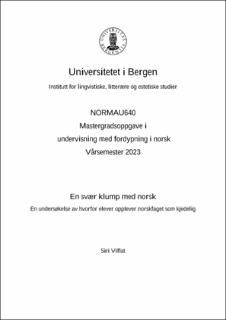| dc.contributor.author | Viflat, Siri | |
| dc.date.accessioned | 2023-05-30T23:59:03Z | |
| dc.date.available | 2023-05-30T23:59:03Z | |
| dc.date.issued | 2023-05-15 | |
| dc.date.submitted | 2023-05-30T22:00:54Z | |
| dc.identifier.uri | https://hdl.handle.net/11250/3069369 | |
| dc.description.abstract | Sammendrag Denne studien undersøker en oppfatning av at mange elever på studieforberedende utdanningsprogram i videregående skole synes at norsk er et av de kjedeligste fagene. Målet har vært å finne ut om det virkelig er slik, og i så fall hvorfor, slik at norsklærere kanskje kan finne noen nøkler til å forbedre situasjonen. Den overordnede problemstillingen er: Hvorfor opplever mange elever på studieforberedende utdanningsprogram norskfaget som kjedelig? Videre har jeg operasjonalisert problemstillingen gjennom følgende forskningsspørsmål: 1) Hvordan beskriver elevene selv sin opplevelse av norskfaget? 2) I hvilke situasjoner (tematisk, metodisk og innholdsmessig) er det elevene opplever faget som kjedelig? 3) Er det sider ved rammefaktorene elevene tenker påvirker deres holdning til faget? 4) Er det sider ved samfunnsdiskursen elevene tenker påvirker deres holdning til faget? Det er i hovedsak to teoretiske innfallsvinkler som belyser materialet: Den ene er Wolfgang Klafkis dannelsesteori og diskusjonen om danning kontra nytte i norsk skole. Den andre er Reinhard Pekruns teori om kjedsomhet i akademiske situasjoner. Studien ble innledet med en kvantitativ undersøkelse der 142 elever fra studieforberedende utdanningsprogram blant annet fikk beskrive sin opplevelse av norskfaget og svare på spørsmål om hvor godt de likte ulike deler av faget. De skulle også rangere skolefagene etter hvor godt de likte dem. Denne undersøkelsen bekreftet at det er en utbredt oppfatning at norsk er kjedelig, og norskfaget kom i snitt nest nederst på rangeringslista til informantene. Jeg inviterte elleve av informantene fra den kvantitative undersøkelsen til å delta i fokusgruppeintervjuer. De viktigste funnene fra intervjuene er at informantene opplever norskfaget som repetitivt, ensformig og «rotete». At faget er stort, både i timetall og varighet i år, bidrar også til negative holdninger. De synes det er krevende å oppnå gode karakterer, og de er kritiske til at det er så mange karakterer knyttet til norsk på vitnemålet. Språk- og litteraturhistorie, skjønnlitterær analyse og sidemålsundervisning oppleves som lite relevant, mens mer instrumentelle ferdigheter, som rettskriving og sakprosaskriving, oppleves som relevant og nyttig. Studien konkluderer med at både årsakene til at norskfaget oppleves som kjedelig, og svarene på hvordan vi kan gjøre noe med dette, er sammensatte. Både skolen, elevene og foreldrene kan bidra til en mer positiv utvikling innenfor norskundervisningen. | |
| dc.description.abstract | Abstract This study examines a perception that many students in the programme for general studies in upper secondary school find the subject Norwegian to be one of the most boring. The aim has been to establish whether this really is the case, and if so, why, so that teachers of the subject may find keys to improve the situation. The main research problem is: Why do so many students in the programme for general studies find the subject Norwegian to be boring? I seek to answer the main issue through these research questions: 1) How do students describe their experience with the subject Norwegian? 2) In which situations (thematically, methodically and in terms of content) do students experience the subject as boring? 3) Are there aspects of the subject’s framework that the students think affect their attitude towards it? 4) Are there aspects of the social discourse that the students think affect their attitude towards the subject? The theoretical background of this study consists of two main approaches: Firstly, Wolfgang Klafki’s theory concerning material, formal and categorical education (Bildung), and the discussion of Bildung versus utility in the Norwegian education system. Secondly, Reinhard Pekrun’s theory of boredom in academic settings. The first part of the study consists of a quantitative survey. 142 students were asked to describe their experience with the subject Norwegian. There were also questions concerning how well they liked different aspects of the subject. Finally, they were asked to rank their school subjects after preference. This survey confirmed a widespread perception that the subject Norwegian is boring, and the subject came in average second last on the ranking list. I invited 11 of the informants from the survey to participate in focus group interviews. The main findings from the interviews are that the informants experience the subject as repetitive, monotonous and lacking structure. The subject is large, both in terms of hours per year and duration in years, and this contributes to a negative attitude amongst the students. They find it hard to achieve good grades, and they are critical towards the fact that there are so many grades in Norwegian on the diploma. The history of language and literature, analysing fiction and poetry, and learning a secondary written language, are seen as irrelevant, whereas skills of a more instrumental character, such as orthography and writing factual prose, are regarded as relevant and useful. The study concludes that the causes of why Norwegian is experienced as a boring subject, and the answers to how we can change this, are complex. The school, the students and the parents can all contribute to a more positive development regarding the teaching of Norwegian. | |
| dc.language.iso | nob | |
| dc.publisher | The University of Bergen | |
| dc.rights | Copyright the Author. All rights reserved | |
| dc.title | En svær klump med norsk - En undersøkelse av hvorfor elever opplever norskfaget som kjedelig | |
| dc.type | Master thesis | |
| dc.date.updated | 2023-05-30T22:00:54Z | |
| dc.rights.holder | Copyright the Author. All rights reserved | |
| dc.description.degree | Erfaringsbasert masteroppgave i undervisning med fordypning i norsk | |
| dc.description.localcode | NORMAU650 | |
| dc.description.localcode | VID-MAUNOR | |
| dc.subject.nus | 711123 | |
| fs.subjectcode | NORMAU650 | |
| fs.unitcode | 11-21-0 | |
